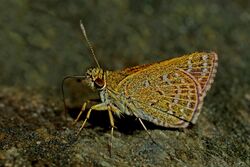Biology:Aeromachus stigmata
| Aeromachus stigmata | |
|---|---|

| |
| Lateral view | |
| Scientific classification | |
| Domain: | Eukaryota |
| Kingdom: | Animalia |
| Phylum: | Arthropoda |
| Class: | Insecta |
| Order: | Lepidoptera |
| Family: | Hesperiidae |
| Genus: | Aeromachus |
| Species: | A. stigmata
|
| Binomial name | |
| Aeromachus stigmata (Moore, 1878)
| |
Aeromachus stigmata, the veined scrub hopper, is a skipper, a type of butterfly in the family Hesperiidae. The species was first described by Frederic Moore in 1878.[1][2][3]
Subspecies
There are three subspecies of Aeromachus stigmata:[1][4]
- Aeromachus stigmata stigmata (Moore, 1878) – Himalayan veined scrub hopper
- Aeromachus stigmata obsoleta (Moore, 1878) – Patkai veined scrub hopper
- Aeromachus stigmata shanda
Description
The wingspan is 22–28 mm (1–1 in).[1] The species was described by Edward Yerbury Watson in his 1891 Hesperiidae Indica as:
Male and female. Upperside glossy olive-brown: forewing with a short black bar or brand of raised scales obliquely above the middle of hind margin, and a very indistinct upper discal slightly curved row of six small pale spots: cilia whitish-cinereous, with slight brown bars. Underside paler; costal border of the forewing, veins, and basal interspaces of the hindwing speckled with greenish-grey; forewing with whitish discal maculated band as above, but more distinct, a spot at end of the cell and a marginal row of lunules less distinct; hindwing with a distinct whitish cell-spot and a submarginal and marginal lunular band. Female without the raised bar and the discal band above less distinct.[1]
Distribution and habitat
Aeromachus stigmata stigmata is distributed from Murree in Pakistan to Arunachal Pradesh; the north sest Himalayas, Sikkim and Bhutan. A. s. obsoletus is distributed in north-eastern India, south-eastern Bangladesh, and northern Myanmar. A. s. shanda is found in Myanmar from the northern Shan States to Kayin State.[1]
They are predominantly found from the foothills to 1700 meter open forest regions. Their flight period is from April to October.[1] In India, May is the best time to spot them. They fly close to the ground and are sometimes spotted basking on the shrubs or grass.[1]
References
- ↑ 1.0 1.1 1.2 1.3 1.4 1.5 1.6 Watson, E. Y. (1891). Hesperiidae Indica: Being a Reprint of Descriptions of the Hesperiidae of India, Burma and Ceylon. Madras: Vest and Company. p. 74.
- ↑ "Aeromachus stigmata Moore, 1878". https://www.gbif.org/species/1945824.
- ↑ "Taxonomy browser (Aeromachus stigmata)". National Center for Biotechnology Information, U.S. National Library of Medicine. https://www.ncbi.nlm.nih.gov/Taxonomy/Browser/wwwtax.cgi?mode=Info&id=1678239&lvl=3&p=has_linkout&lin=f&keep=1&srchmode=1&unlock.
- ↑ "Aeromachus stigmata (Moore, 1878) – Veined Scrub Hopper". https://www.ifoundbutterflies.org/#!/sp/2109/Aeromachus-stigmata. Retrieved 21 August 2020.
Wikidata ☰ Q13231324 entry
 |

